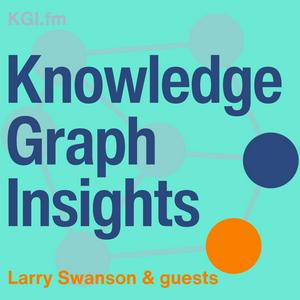Ole Olesen-Bagneux: Understanding Enterprise Metadata with the Meta Grid – Episode 28
Ole Olesen-Bagneux
In every enterprise, says Ole Olesen-Bagneux, the information you need to understand your organization's metadata is already there. It just needs to be discovered and documented.
Ole's Meta Grid can be as simple as a shared, curated collection of documents, diagrams, and data but might also be expressed as a knowledge graph.
Ole appreciates "North Star" architectures like microservices and the Data Mesh but presents the Meta Grid as a simpler way to manage enterprise metadata.
We talked about:
his work as Chief Evangelist at Actian
his forthcoming book, "Fundamentals of Metadata Management"
how he defines his Meta Grid: an integration architecture that connects metadata across metadata repositories
his definition of metadata and its key characteristic, that it's always in two places at once
how the Meta Grid compares with microservices architectures and organizing concepts like Data Mesh
the nature of the Meta Grid as a small, simple, and slow architecture which is not technically difficult to achieve
his assertion that you can't build a Meta Grid because it already exists in every organization
the elements of the Meta Grid: documents, diagrams or pictures, and examples of data
how knowledge graphs fit into the Meta Grid
his appreciation for "North Star" architectures like Data Mesh but also how he sees the Meta Grid as a more pragmatic approach to enterprise metadata management
the evolution of his new book from a knowledge graph book to
his elaboration on the "slow" nature of the Meta Grid, in particular how its metadata focus contrasts with faster real-time systems like ERPs
the shape of the team topology that makes Meta Grid work
Ole's bio
Ole Olesen-Bagneux is a globally recognized thought leader in metadata management and enterprise data architecture. As VP, Chief Evangelist at Actian, he drives industry awareness and adoption of modern approaches to data intelligence, drawing on his extensive expertise in data management, metadata, data catalogs, and decentralized architectures. An accomplished author, Ole has written The Enterprise Data Catalog (O’Reilly, 2023). He is currently working on Fundamentals of Metadata Management (O’Reilly, 2025), introducing a novel metadata architecture known as the Meta Grid. With a PhD in Library and Information Science from the University of Copenhagen, his unique perspective bridges traditional information science with modern data management.
Before joining Actian, Ole served as Chief Evangelist at Zeenea, where he played a key role in shaping and communicating the company’s technology vision. His industry experience includes leadership roles in enterprise architecture and data strategy at major pharmaceutical companies like Novo Nordisk.Ole is passionate about scalable metadata architectures, knowledge graphs, and enabling organizations to make data truly discoverable and usable.
Connect with Ole online
LinkedIn
Substack
Medium
Resources mentioned in this interview
Fundamentals of Metadata Management, Ole's forthcoming book
Data Management at Scale by Piethein Strengholt
Fundamentals of Data Engineering by Joe Reis and Matt Housley
Meta Grid as a Team Topology, Substack article
Stewart Brand's Pace Layers
Video
Here’s the video version of our conversation:
https://youtu.be/t01IZoegKRI
Podcast intro transcript
This is the Knowledge Graph Insights podcast, episode number 28. Every modern enterprise wrestles with the scale, the complexity, and the urgency of understanding their data and metadata. So, by necessity, comprehensive architectural approaches like microservices and the data mesh are complex, big, and fast. Ole Olesen-Bagneux proposes a simple, small, and slow way for enterprises to cultivate a shared understanding of their enterprise knowledge, a decentralized approach to metadata strategy that he calls the Meta Grid.
Interview transcript
Larry:
Hi,
